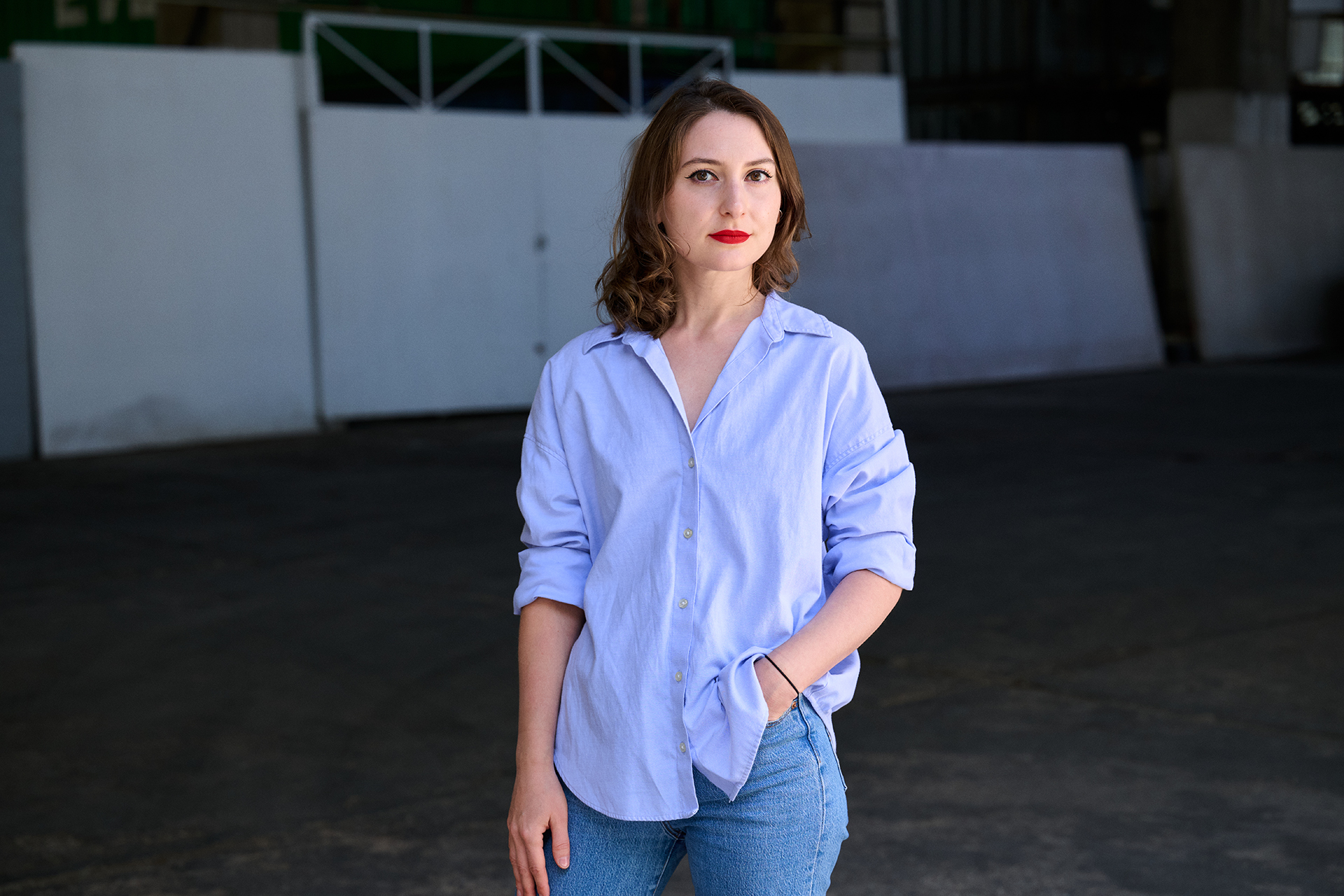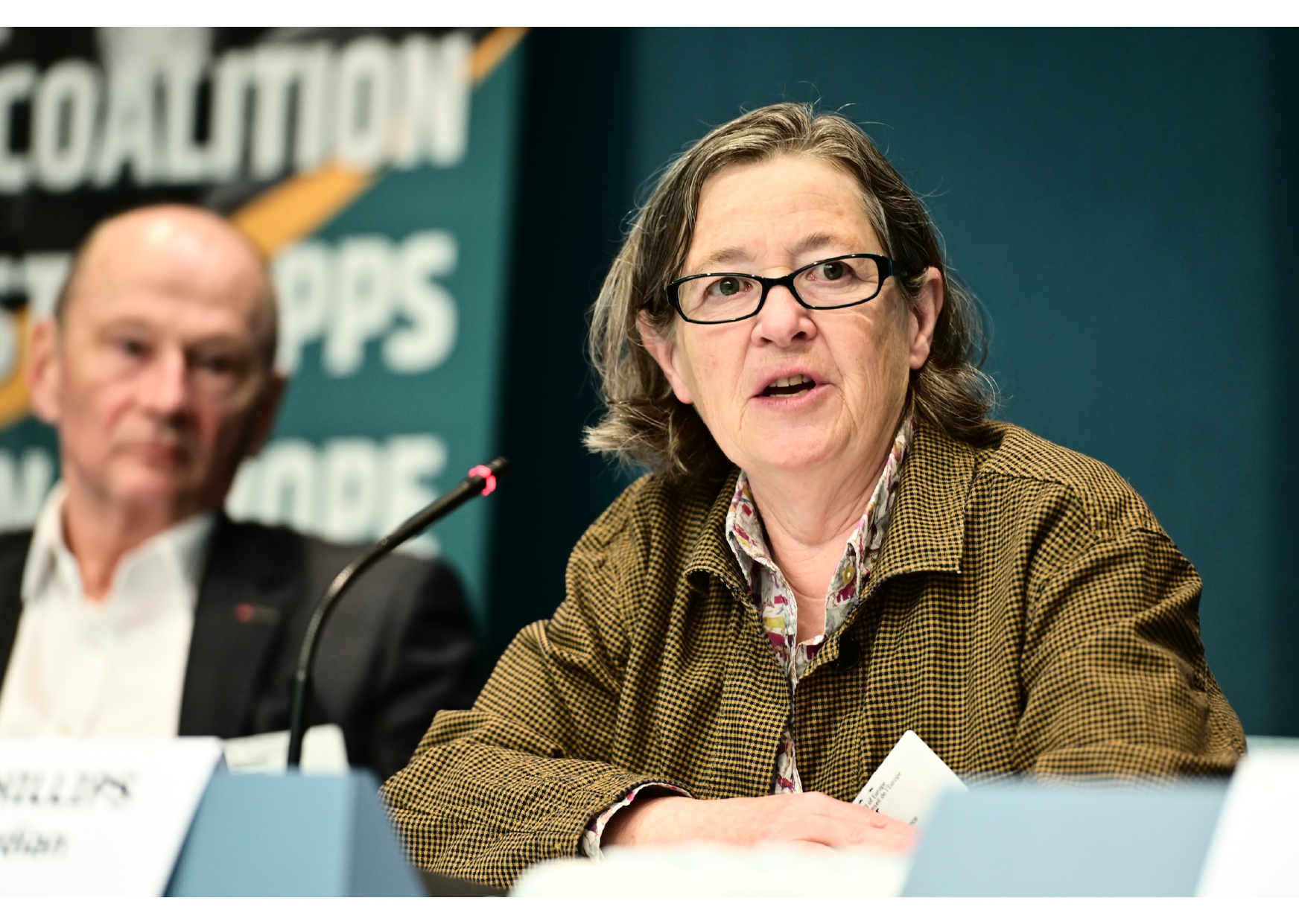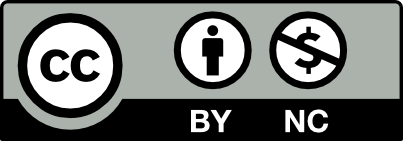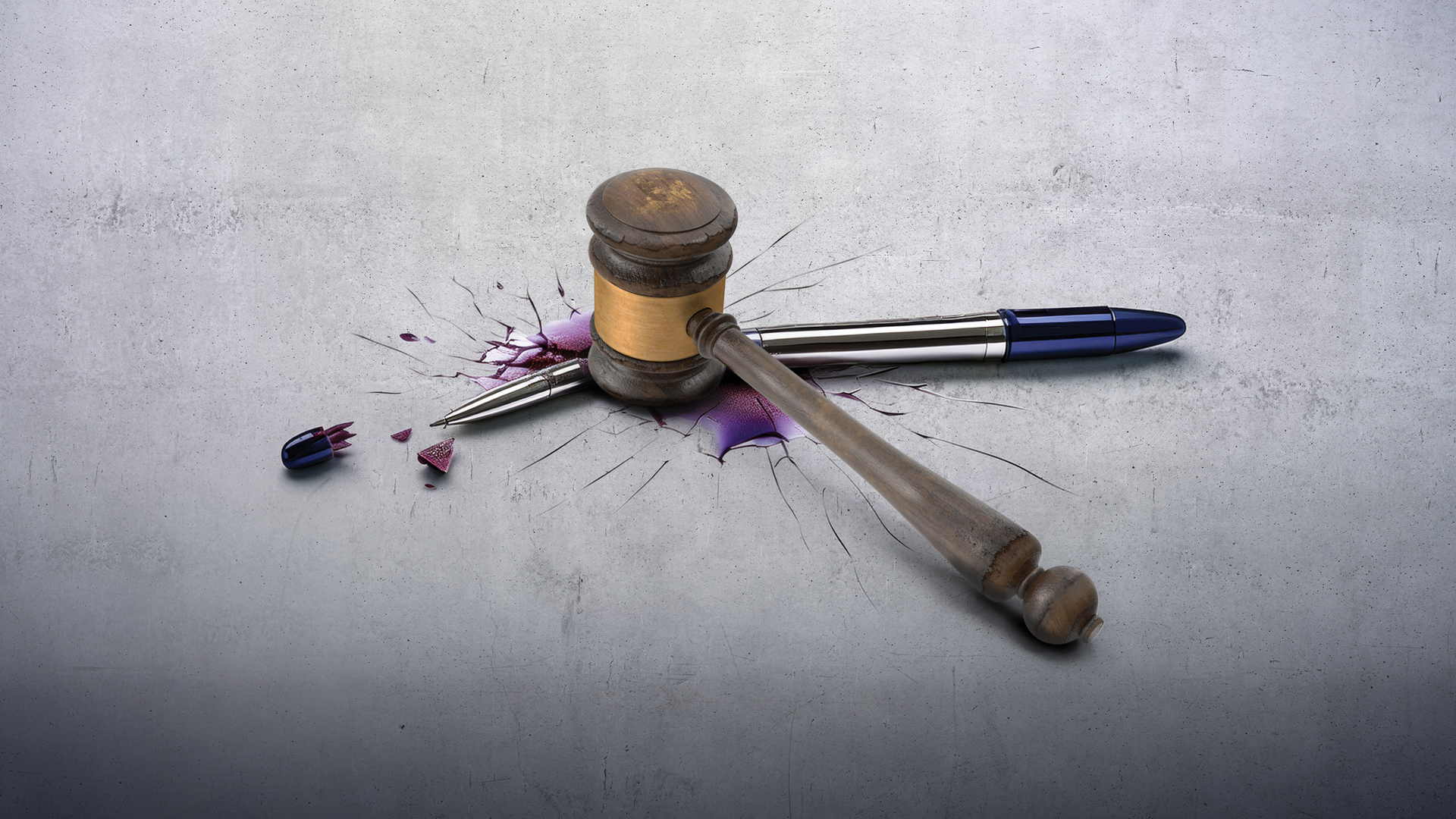What are the legal pressures against the press, and how can journalists continue to operate freely under conditions that are becoming increasingly difficult?
Main Illustration: Evgenios Kalofolias
During the first half of 2025, MapMF, which is managed by the European Centre for Press and Media Freedom and the Media Freedom Rapid Response project, recorded 709 violations of press freedom in European Union member states and candidate countries. One quarter of these were of a legal nature.
Nieman Lab’s editor on words, violence, and the (US) Press

Laura Hazard Owen, Harvard’s influential online publication for media, spoke to iMEdD about violence, censorship, and why she still believes in defending the First Amendment.
What are the dangers?
Shortly before the New Year, on December 30, 2021, the founder of the media outlets Holod.Media and Kosa.Media, Taisia Bekbulatova, was labelled a “foreign agent” by the Russian government. A few days later, collaborators from a journalistic outlet, with which Bekbulatova and her team were preparing a joint project, attempted to exclude her name from it. “I didn’t like it because it was not like the pressure from the government. It was pressure by my fellow colleagues. And it felt unfair.” Bekbulatova remembers. “That was the first thing when I realised that life had changed for me”. In the following period, some sources stopped talking to her and a few colleagues distanced themselves.

With the implementation of “foreign agent” laws in Russia, journalists who receive foreign funding, are connected to, or distribute content from foreign entities can be labeled as “foreign agents.” Russia was one of the first countries to adopt such legislation, as early as 2012. In the following years, countries such as Nicaragua, Georgia, Turkey, and Hungary followed a similar path.
As Bekbulatova describes, this designation follows journalists in their publications and social media posts, and they may be prohibited from covering political topics, have their websites blocked, face heavy fines for themselves or their outlets, and non-compliance can lead to imprisonment.
In this year’s iMEdD’s International Journalism Forum, journalists and legal experts facing such pressures gathered to discuss the constantly changing legal landscape, which is creating increasing threats for journalists. During the panel discussion, “The rising threat of “foreign agent” laws in Europe – A new era of media repression?,” Flutura Kusari, senior legal advisor at the European Centre for Press and Media Freedom (ECPMF), used the term “stigmatization” to describe the situation of Bekbulatova, journalists, media outlets, and organizations labeled as “foreign agents.”
According to a related report by the Thomson Reuters Foundation and the Tow Center for Digital Journalism at Columbia University, charges of espionage, treason, and/or foreign influence constitute one of the eight main legal risks journalists face today. These include defamation and insult laws, “fake news” legislation, lese majeste (as in the case of Thailand), disrespect toward authorities, and subversive defamation, counterterrorism and counter-extremism legislation, economic crimes and cybercrimes, as well as Strategic Lawsuits Against Public Participation (SLAPPs).
In 2024, the Committee to Protect Journalists reported that 376 journalists were still imprisoned worldwide. As Kusari notes, those in positions of power who are disturbed by journalistic investigations prefer to target journalists through the legal system. “They are using legal procedures, legislation, and abusive lawsuits to go after journalists,” she explains.

One of the most common strategies to silence journalists in Europe, which has begun spreading worldwide, is SLAPPs. According to the Reuters and Tow Center report, such cases have increased significantly since 2015.
In SLAPP lawsuits, various legal tools are used to pressure media outlets and journalists. Kusari describes the process as follows: “When articles about [those in power] are being published, or something is being said about them which is critical of, let’s say, a politician, a businessman, they file a lawsuit to intimidate journalists, to create confusion about whether the journalist was right or not and also, to make them suffer.”
Just being with people who can give you support so that you’re not isolated, which is one of the things that SLAPPs can do: isolate people and leave them feeling vulnerable. All of that can be quite helpful.
Gillian Phillips, freelance editorial lawyer
Gillian Phillips, a freelance editorial lawyer and former editorial legal director at The Guardian, adds that legal proceedings, whether they have merit or are ultimately dismissed as unfounded, consume time and money, as in many cases, plaintiffs demand large sums from the defendants. “All of this, naturally, has a chilling effect, and when other people see that Mister X is going after whatever small NGO, it is going to impact them in terms of other people talking about the same things. So, it has wider implications.”
The threats are not limited to journalists alone. Often, the lawyers defending journalists facing criminal prosecution as well as those involved in related cases, also encounter difficulties in practising their profession. The preliminary report “Defending the Defenders: Legal Threats Against Lawyers Protecting Journalists” by American Bar Association Centre for Human Rights, τον οργανισμό Media Defence και το Thomson Reuters Foundation describes how lawyers may face obstruction in representing their clients, as well as threats of murder, bodily harm, and forced flight or exile.
Fact checking and the ΒΒC – Trump example
“Check the facts. Check the facts. Check the facts,” Kusari quickly responds when asked how a journalist can protect themselves from such legal actions. “I think, first and foremost, journalists really need to have a very good recording of documents, sources, everything.” Phillips agrees: “One of the things that I think is really tricky about SLAPPs is that sometimes, people may have said something that is a little bit wrong, but there are ways of resolving that […] without necessarily suing people straight away in the courts with big threats.”
If you seek accountability from someone, then first and foremost, you should be an example yourself.
Flutura Kusari, senior legal advisor at the European Centre for Press and Media Freedom (ECPMF)
One of these difficult cases is the recent dispute between the BBC and the President of the United States, Donald Trump. In early November 2025, the BBC faced criticism regarding the falsification of a speech excerpt that was aired in an episode of the documentary series Panorama in October 2024. The manipulated clip from January 6, 2021, presents Trump as urging his audience to attack the U.S. Capitol. A few days later, the BBC issued an apology to Trump, many of the network’s senior officials resigned, but his claim for $1 billion in damages was rejected. Nevertheless, Trump decided to take legal action against the network.
Phillips classifies this case as a SLAPP, as it meets many of the criteria set by the European Commission. Phillips maintains that a defamation case should result in negative economic and social consequences for the affected party—something that is not demonstrated in the case of the American President, who was re-elected a year ago. Specifically, she states: “It’s not exactly David and Goliath in the sense that the BBC is not just, you know, a small individual being sued by Trump. But it is a classic SLAPP in many ways, in the sense that he’s a very high-up political figure who has an enormous amount of clout […]. There seems to be a consensus, including from the BBC, that it was wrong and that it was misleading to put those two bits together. But that doesn’t mean that something is legally actionable just because you’ve made a mistake, however big the mistake is”.

Jelani Cobb on freedom of speech, the Press, and White House reporting

Jelani Cobb, Dean of the Columbia Journalism School, author, and longtime staff writer for The New Yorker, speaks to iMEdD about academic freedom in the United States, the challenges facing the press today, so-called “Trump coverage,” and the public interest as journalism’s enduring mission.
How to protect yourself
Knowledge of the law can help in many cases when preparing a difficult report. “If you seek accountability from someone, then first and foremost, you should be an example yourself,” Kusari notes. “You can’t go and say to the police you need to be fired because you passed the limits of driving, whereas the same journalist is caught drinking or whatever while driving. So, I think the behavior of journalists also outside of the journalistic work should be very, very careful because we’re all exposed.”
The trust between a lawyer and journalist is special. It’s the trust that is built.
Flutura Kusari, senior legal advisor at the European Centre for Press and Media Freedom (ECPMF)
“I think journalists also need to be savvy and aware of what defences they have in their own country,” Phillips adds. “They should know that if they’re going to write in a particular way, they’re going to have to defend it as truth […]. Training journalists, being aware of the law in their countries and how it might be used against them and thinking about that, [makes a difference].”
This is why journalists must have easy access to legal advice. The two legal advisors recommend consulting with lawyers before publication. Kusari points out: “The trust between a lawyer and journalist is special. It’s the trust that is built.”
However, there are situations where legal knowledge is not enough, such as in cases involving “foreign agent” laws. “If you are in the country where you have been named [a ‘foreign agent’], it’s almost impossible for you to work. That’s why [journalists] leave,” Kusari notes.
Journalists facing legal pressures should not feel alone. “Just being with people who can give you support so that you’re not isolated, which is one of the things that SLAPPs can do: isolate people and leave them feeling vulnerable. All of that can be quite helpful,” Phillips tells iMEdD. “There’s also a lot of support available now. There are networks, […] who can offer a lot of advocacy support and legal support in some instances.” Such networks include:
- Media Freedom Rapid Response (MFRR)
Having a protection network matters; both inside and outside the office. For Bekbulatova, the solution was to leave her country and the outlet she founded in Russia. In exile, she decided to start something new, maintaining a remote newsroom with collaborators in 19 different cities worldwide. “We have several Zoom calls each week to make people aligned, because it’s really easy to fall apart when you are not seeing each other every day and lose the sense of being together and having the same goals,” she explains. “People feel depressed […]. Immigration is a hard process. […] Sometimes [colleagues] lose the sense of impact, and you need to be able to provide them with psychological support […]. But also, you need to be able to work quite effectively and still serve your audience. Which is not easy.”

